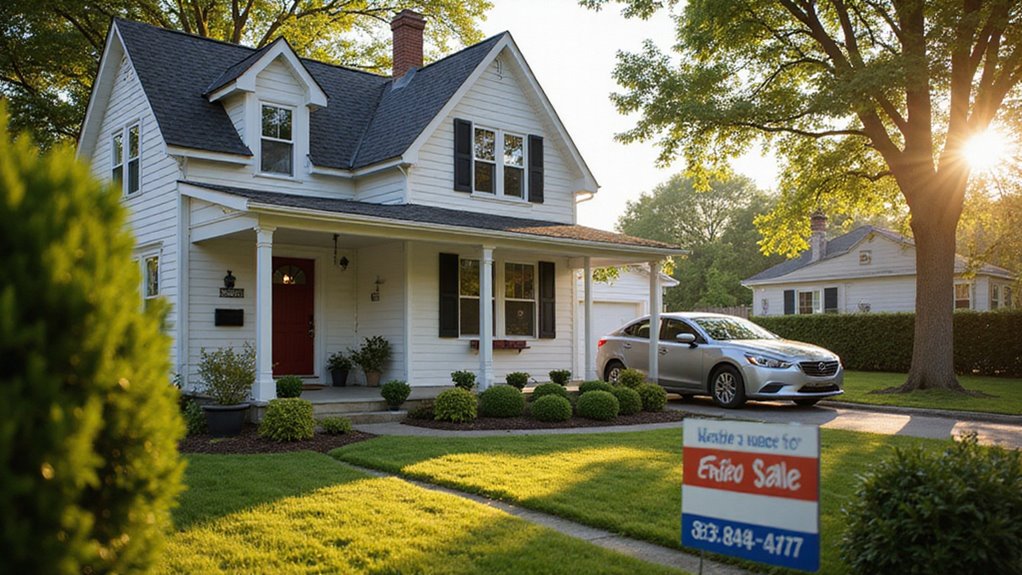Trapped in a mortgage while needing to sell your home feels like wearing handcuffs during a swimming competition. Many homeowners fear they can’t legally sell without full mortgage repayment. This uncertainty creates stress and confusion when life changes demand relocation. Fortunately, selling before payoff is completely possible with proper planning and lender coordination.
You absolutely can sell your house before paying off the mortgage. The lender will simply collect what you owe from your sale proceeds at closing. Your mortgage payoff amount must be covered by the sale price, along with any transaction costs. In this blog I will explore the entire process of selling a house with an outstanding mortgage.
Key Takeaways
- Selling a house with an outstanding mortgage is possible; proceeds are used to pay off the loan at closing.
- You must request a payoff amount from your lender before closing to settle the mortgage.
- Lender releases the lien after mortgage payoff, enabling the property transfer to the new owner.
- Selling with negative equity may involve short sales, requiring lender approval and legal considerations.
- Cash buyers like Shawn Buys Houses can simplify the process, often closing within days without repairs or financing delays.
Can You Sell a House Before Paying It Off?

Yes, you can sell a house before paying off the mortgage. The lender will require the mortgage to be paid from the sale proceeds at closing. This process happens automatically during the transaction.
Your lender must release their lien on the property before ownership can transfer to the new buyer. Even with negative equity, options exist. Short sales allow you to sell for less than you owe with lender approval.
The key is communication with your lender. They’ll provide a payoff amount that includes the remaining principal balance plus any fees. Most homeowners use their sale proceeds to clear this debt completely.
What Happens to Your Mortgage When Selling?

When you sell your house, the mortgage gets paid off during closing. The money from the sale covers your remaining loan balance. Your lender then removes their claim on the property by issuing a lien release. The process involves several key steps. First, you must request a payoff amount from your lender.
At closing, sale proceeds automatically go toward paying off the remaining mortgage balance. The lender then provides documentation that releases their legal claim.
This release allows the title to transfer to the new buyer without any mortgage debt attached. The final paperwork officially records this change in ownership status. Your responsibility for that mortgage ends completely once the sale closes.
How Much Equity Do You Need to Sell?

You need at least 10% equity to sell your house successfully. Equity represents the difference between your home’s value and what you owe on it. This amount helps cover your mortgage payoff and all selling costs.
Calculate your equity by subtracting your current mortgage balance from your home’s market value. The resulting figure must exceed both your remaining loan balance and all transaction costs combined.
Your sale proceeds should comfortably cover your mortgage payoff, agent commissions, and closing fees. In most cases, having 10-20% equity provides a safe margin for a smooth transaction. However, local market conditions might affect this requirement.
Can You Sell a House With Negative Equity?
Yes, you can sell a house with negative equity, but it’s not a straightforward process. You’ll need to explore specific options when your mortgage exceeds your home’s value.
A short sale might be your best solution if your lender approves it. This allows you to sell for less than what you owe. However, you should consider all implications before proceeding. Oklahoma law permits lenders to pursue deficiency judgments for remaining debt after a sale.
Furthermore, timing matters in these situations. Consult with a real estate attorney to understand potential consequences and protect your financial interests. The process requires patience and careful planning.
How to Sell Your House With an Existing Mortgage
To sell your house with an existing mortgage, you need a payoff statement from your lender that details the amount owed. You’ll work with a licensed real estate agent to handle the sale and ensure all legal requirements are met.
At closing, the title company will pay off your mortgage and release the lien before transferring ownership, but you must address any remaining balance if sale proceeds fall short.
Getting a Payoff Statement
You need to request a payoff statement from your mortgage lender before selling your home. This official document shows the exact amount needed to fully satisfy your loan. It includes your remaining principal balance, interest, and any closing fees. The statement prevents unexpected costs at closing time.
Most lenders provide this document within 5-7 business days after your request. By law, lenders must deliver accurate payoff statements within a reasonable timeframe. For best results, contact your lender at least two weeks before your scheduled closing date.
Working With a Real Estate Agent
Real estate agents handle mortgage details when you sell your home. They manage the payoff process for your existing mortgage. Agents coordinate with title companies to ensure proper documentation.
Oklahoma law requires specific procedures for mortgage transfers during sales. These professionals negotiate on your behalf and protect your interests. They verify all liens are cleared before closing.
Your agent tracks deadlines and paperwork requirements. Furthermore, they communicate with all parties to prevent delays. The right agent makes your sale smoother and less stressful. In most cases, they save you time and prevent costly mistakes.
Closing Process and Paying Off the Mortgage
The closing process settles your existing mortgage when you sell your home. First, request a payoff statement from your lender showing the exact amount needed. Sale proceeds must cover your remaining mortgage balance plus any fees.
The title company handles the final payment to your lender. Your lender then releases the lien on your property. After this step, ownership transfers to the new buyer. Additionally, the title company ensures all paperwork is correctly processed. This careful sequence protects both you and the buyer from future claims.
Handling Remaining Balance After Sale
You must address any leftover mortgage debt after your home sells. If sale proceeds cover your loan, you’ll receive the surplus money. When proceeds fall short, you have a deficit that requires action. Options include paying the difference from savings or negotiating with your lender.
A short sale allows you to sell the home for less than you owe with lender approval. This option helps avoid foreclosure. Additionally, some lenders might forgive part of the debt in certain situations. The best approach depends on your financial position and lender policies. Nevertheless, addressing the balance promptly prevents credit damage and legal complications.
What Are the Costs of Selling Before Paying Off?
Selling a home before paying off your mortgage involves several financial impacts. You’ll face mortgage payoff costs, which may include pre-payment penalties if specified in your loan terms. Closing costs typically range from 2-5% of your home’s sale price. These cover transfer fees and real estate agent commissions.
Your lender might also charge separate pre-payment fees that reduce your profit. Additionally, you must settle your remaining loan balance from the sale proceeds. Before listing your property, request a payoff statement to understand exact figures.
What Are Your Options for a Fast Home Sale?
If you need to sell your home quickly, you have several options. You can list traditionally on the MLS, sell to cash buyers for a faster close, or consider rent-to-own agreements. Each approach offers different speed and convenience levels to fit your timeline.
Traditional Market Listing
A traditional market listing helps sell your home through a professional realtor. Your property appears on the Multiple Listing Service (MLS), which reaches thousands of potential buyers. The realtor handles showings, negotiations, and paperwork on your behalf. The sale typically involves three key steps.
First, your home gets listed on the MLS database. Second, your agent manages all buyer interactions and offer negotiations. Finally, proceeds from the sale pay off your remaining mortgage balance. After closing, you receive the net proceeds after mortgage payoff and realtor commission deductions. In most cases, this approach provides wide market exposure.
Selling to Cash Home Buyers
Cash home buyers purchase properties directly with immediate payment. They provide a faster alternative to traditional real estate sales. You can complete transactions in days rather than months. These buyers often purchase homes in any condition without repairs.
For underwater properties, cash buyers still make offers despite negative equity. Most cash buyers handle mortgage payoff coordination with your lender. This process eliminates the typical stress of balancing payoffs. As a result, you receive a straightforward closing experience.
Furthermore, cash buyers rarely back out due to financing issues. Their offers typically involve fewer contingencies. This approach offers certainty during an otherwise unpredictable selling process.
Rent-to-Own Arrangements
Rent-to-own arrangements let buyers live in a home before purchasing it. These deals create a path to ownership through regular rent payments. A portion of each payment typically applies toward the purchase price.
Sellers receive steady income while buyers build equity over time. This option works well for buyers with credit issues or limited down payments. For sellers, it provides a consistent revenue stream without immediate sale pressures.
Additionally, property maintenance responsibilities often shift to the tenant-buyer. The agreement usually specifies a future purchase price and timeframe. However, these terms vary widely based on individual contracts.
Need to Sell Your House Fast? Contact Shawn Buys Houses Today
Yes, Shawn Buys Houses can purchase your home quickly. We offer fast, fair prices based on your property’s actual value without requiring repairs. Our process prioritizes your needs with clear steps and transparent communication throughout the sale. We handle all paperwork and negotiations with mortgage lenders to save you time.
Most sellers can close within 7-14 days depending on their situation. Furthermore, we take care of closing costs and fees. Our team focuses on creating solutions that work for you. Many homeowners choose us when facing foreclosure, divorce, inheritance situations, or when relocating for work opportunities.
Frequently Asked Questions
Can I Sell My House Without Notifying My Lender First?
You can’t simply skip notifying your lender; it’s essential to communicate promptly. Properly manage the mortgage, meet legal requirements, and maintain transparency to prevent problems, protect your property, and ensure a smooth, successful sale.
What Happens if My Sale Doesn’t Cover My Mortgage Balance?
If your sale doesn’t cover your mortgage, you’ll owe the remaining balance to the lender. You must negotiate repayment, possibly seek a short sale if approved, or consider other options like debt settlement to resolve the deficiency.
Are There Specific Legal Restrictions for Selling With a Mortgage in Oklahoma?
Consider selling your Oklahoma home as passing a baton in a relay race. Legally, you must ensure the mortgage is paid off at closing, and lenders must release the lien before you transfer ownership.
How Long Does the Mortgage Payoff Process Usually Take?
The mortgage payoff process typically takes 7 to 10 business days after requesting the payoff statement. You can help clients by ensuring all documents are accurate and timely, facilitating a smooth, efficient transaction.
Can I Sell My House During Foreclosure Proceedings?
Like a captain steering through stormy seas, you can sell your house during foreclosure if the lender approves, paying off your mortgage and satisfying legal requirements. Act quickly, consult professionals, and prioritize transparency to help all parties.


